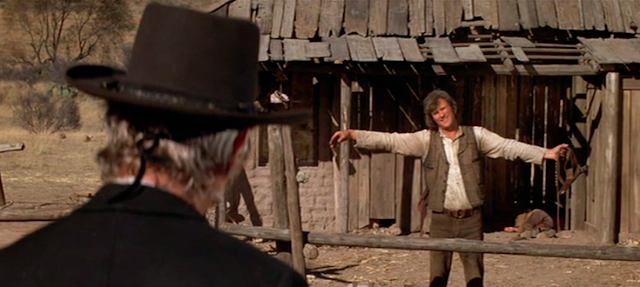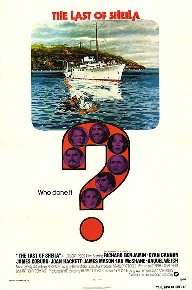A blog formerly known as Bookishness / By Charles Matthews
"Dazzled by so many and such marvelous inventions, the people of Macondo ... became indignant over the living images that the prosperous merchant Bruno Crespi projected in the theater with the lion-head ticket windows, for a character who had died and was buried in one film and for whose misfortune tears had been shed would reappear alive and transformed into an Arab in the next one. The audience, who had paid two cents apiece to share the difficulties of the actors, would not tolerate that outlandish fraud and they broke up the seats. The mayor, at the urging of Bruno Crespi, explained in a proclamation that the cinema was a machine of illusions that did not merit the emotional outbursts of the audience. With that discouraging explanation many ... decided not to return to the movies, considering that they already had too many troubles of their own to weep over the acted-out misfortunes of imaginary beings."--Gabriel García Márquez, One Hundred Years of Solitude
Search This Blog
Showing posts with label James Coburn. Show all posts
Showing posts with label James Coburn. Show all posts
Sunday, June 2, 2024
Affliction (Paul Schrader, 1997)
Cast: Nick Nolte, James Coburn, Sissy Spacek, Willem Dafoe, Brigid Tierney, Jim True-Frost, Holmes Osborne, Mary Beth Hurt, Marian Seldes. Screenplay: Paul Schrader, based on a novel by Russell Banks. Cinematography: Paul Sarossy. Production design: Anne Pritchard. Film editing: Jay Rabinowitz. Music: Michael Brook.
Friday, August 18, 2017
Pat Garrett and Billy the Kid (Sam Peckinpah, 1973)
 |
| James Coburn and Kris Kristofferson in Pat Garrett and Billy the Kid |
Billy the Kid: Kris Kristofferson
Alias: Bob Dylan
Sheriff Kip McKinney: Richard Jaeckel
Sheriff Baker: Slim Pickens
Mrs. Baker: Katy Jurado
Lemuel: Chill Wills
Chisum: Barry Sullivan
Gov. Lew Wallace: Jason Robards
Ollinger: R.G. Armstrong
Eno: Luke Askew
Poe: John Beck
Alamosa Bill: Jack Elam
Maria: Rita Coolidge
Bowdre: Charles Martin Smith
Luke: Harry Dean Stanton
Director: Sam Peckinpah
Screenplay: Rudy Wurlitzer
Cinematography: John Coquillon
Music: Bob Dylan
With its laid-back pace punctuated by moments of violence, not to mention its soundtrack by Bob Dylan, Pat Garrett and Billy the Kid may be the ultimate stoner Western. After being mutilated by MGM -- the credits list six film editors -- it was savaged by critics on its first release, but the release on video of Sam Peckinpah's original preview version in 1988 caused a reevaluation of the film, with some now calling it a masterpiece. I wouldn't go that far: To my mind the narrative is still too elliptical and the inspiration -- rewriting a myth -- too commonplace. But it has moments of brilliance that transcend its flaws, such as the beautiful sequence of the death of Sheriff Baker, with its fine use of the iconic performers Slim Pickens and Katy Jurado and the underscoring with Dylan's "Knockin' on Heaven's Door." James Coburn, always an underrated actor in his prime, is wonderful as Pat Garrett, and while Kris Kristofferson was never much of an actor, he and Coburn play well against each other. Dylan was no actor, either, but he's used well here as the enigmatic figure who lets himself be known as "Alias," and the scene in which Garrett forces him to read the labels of canned goods while he toys with other members of Billy's gang is nicely done. The gallery of character actors both old (Chill Wills, Jack Elam) and new (Charles Martin Smith, Harry Dean Stanton) is welcome. Its post-censorship era's exploitation of women -- there are an awful lot of bared breasts, though we also get a fleeting butt-shot of Kristofferson -- is overdone, and it certainly wouldn't earn any seal of approval from the American Humane Society after the scene in which live chickens are used for target practice.
Turner Classic Movies
Sunday, August 6, 2017
Charade (Stanley Donen, 1963)
 |
| Walter Matthau and Audrey Hepburn in Charade |
Regina Lampert: Audrey Hepburn
Hamilton Bartholomew: Walter Matthau
Tex Panthollow: James Coburn
Herman Scobie: George Kennedy
Leopold W. Gideon: Ned Glass
Sylvie Gaudet: Dominique Minot
Inspector Grandpierre; Jacques Marin
Director: Stanley Donen
Screenplay: Peter Stone, Marc Behm
Cinematography: Charles Lang
Art direction: Jean d'Eaubonne
Music: Henry Mancini
Charade was dismissed in its day as a pleasant but derivative entertainment, with touches of Hitchcock and a bit of James Bond in the mix, a film that would be nothing without its star teaming of Audrey Hepburn and Cary Grant. It would also inspire other star-teamed romantic adventures with one-word titles, like Warren Beatty and Susannah York in Kaleidoscope (Jack Smight, 1966) and Shirley MacLaine and Michael Caine in Gambit (Ronald Neame, 1966), and Charade's director, Stanley Donen, would even repeat the formula with Gregory Peck and Sophia Loren in Arabesque (1966). But Charade has survived today as a classic when the others have mostly been forgotten. The star teaming has a lot to do with it, of course: Who doesn't want to see the two most charming people in the world together? Owing to Grant's genetic gift for looking much younger than he was, even the 25-year age difference between Grant and Hepburn only slightly tests the limits of what one can accept in a romantic pairing.* But the film also makes sly references to the difference in their ages, and wisely makes Hepburn's character into the more active one in initiating a relationship. Charade also has an exceptionally witty screenplay, with Peter Stone largely responsible for the final script from the story he and Mark Behm had been unable to sell to the studios until they turned it into a novel that was serialized in Redbook magazine. And it has a near-perfect supporting cast, including three actors at turning points in their careers: Walter Matthau, James Coburn, and George Kennedy. All of them would move out of television and into the movies after Charade, and all three would win Oscars for their work. And in Stanley Donen it had a director whose lightness of touch had been honed in MGM musicals, including the greatest of them all, Singin' in the Rain (1952).
Watched on Showtime
*Compare, for example, the similar age gap between James Stewart and Kim Novak in Bell, Book and Candle (Richard Quine, 1958). After that film, Stewart gave up playing romantic leads. Grant made much the same choice: Charade was his antepenultimate film: Although he would make one more, Father Goose (Ralph Nelson, 1964), that paired him with a younger actress, Leslie Caron, in his final film, Walk, Don't Run (Charles Walters, 1966), he was the older man who serves as matchmaker to young lovers -- a role that was based on the part played by Charles Coburn in The More the Merrier (George Stevens, 1943).
Wednesday, April 26, 2017
The Last of Sheila (Herbert Ross, 1973)
Actor Anthony Perkins and songwriter Stephen Sondheim moonlighted as screenwriters to create this jeu d'esprit, a murder mystery involving the kind of elaborate games that Perkins and Sondheim and their friends used to play: treasure hunts with ingenious clues. The setup is this: A year earlier, Sheila, the wife of film producer Clifton Green (James Coburn), was killed in a hit-and-run accident. Green invites six people who were at a party the night of her death to spend a week on his yacht, which is named for her. Before they board, he arranges them for a photo under her name on the prow of the yacht. Then he announces that he is going to give each of them an envelope that contains a secret: something that a person would want to conceal about themselves. Each night, they will dock at a different location and will be given a clue that they must follow to discover the secret. If the person who holds the card with the secret on it solves the puzzle, the hunt of the night is over. So, on the first night, the clues lead to the secret: "Shoplifter." And when Philip (James Mason), a washed-up film director who holds that clue, solves it, the game ends. But the next night, the game isn't completed: Green is found murdered during the hunt. Meanwhile, realization dawns in the group that the secrets were their own: Philip wasn't a shoplifter, but the actress named Alice (Raquel Welch) admits that she once lifted a valuable fur coat from a store. And when the secret for the night Green is killed is revealed to be "Homosexual," Tom (Richard Benjamin), a screenwriter, admits that he and Green once had a brief affair. And so it appears that Green was murdered by someone who didn't want their secret to come out. But just when it appears that the murder has been solved, there's another intricate twist. The screenplay is fiendishly clever, and it's well acted: The other players include Dyan Cannon as a high-powered agent, Joan Hackett as Tom's rich heiress wife, and Ian McShane as Alice's manager-husband. Unfortunately, Herbert Ross directs things a little clunkily, although some of the awkwardness may come from the fact that shooting began on the yacht itself, but bad weather held up the shoot and sets eventually had to be constructed on a soundstage. There was also reportedly some conflict among the cast members and the director, centering on Welch. Today, some of the film's attitudes seem a little antique: Homosexuality is no longer such a terrible secret, although at the time Perkins and Sondheim, both of whom were gay, were still closeted. And perhaps not enough is made of the fact that one of the clues outs a character as a former child molester. The resulting film is something like a soufflé that didn't rise, turning out tasty but a little chewy. The best moments belong to, not surprisingly, Cannon, one of those performers who make every film they're in a little better.
Friday, September 18, 2015
The Magnificent Seven, John Sturges, 1960

In July, Turner Classic Movies, my indispensable source for movies, ran two 1950 films by Akira Kurosawa that demonstrated how profoundly influenced by Hollywood Kurosawa was: the film-noir-steeped The Bad Sleep Well and the romantic drama Scandal. (In the latter, Toshiro Mifune plays a pipe-smoking, motorcycle-riding artist who could have come out of a Paramount or 20th Century-Fox film of the 1940s -- an imitation of any number of Hollywood leading men of the era, such as Gregory Peck, Dana Andrews, or Joel McCrea.) But as any Kurosawa fan knows, the major influence on his films, especially his samurai movies, was the American Western. No wonder that filmmakers eventually turned things around and borrowed from the borrower. Sturges's version of Kurosawa's Seven Samurai (1954), was the first to do so, but Martin Ritt soon followed suit with The Outrage (1964), his version of Rashomon (Kurosawa, 1950), and Kurosawa sued Sergio Leone because of the unacknowledged remake of Yojimbo (1961) called A Fistful of Dollars (1964). The Magnificent Seven, though probably the best of the Kurosawa copies, pales in comparison with its source, but it helped make Steve McQueen, Charles Bronson, and James Coburn into stars. In his book Escape Artist: The Life and Films of John Sturges, my former Mercury News colleague Glenn Lovell has some amusing stories about the jousting among the actors for screen time, and you can clearly see McQueen, with his more naturalistic style, upstaging the stiff and mannered Yul Brynner.
Subscribe to:
Comments (Atom)









